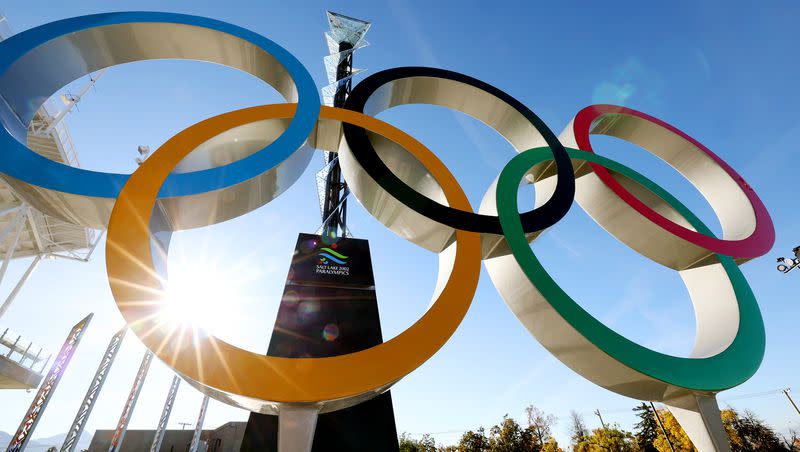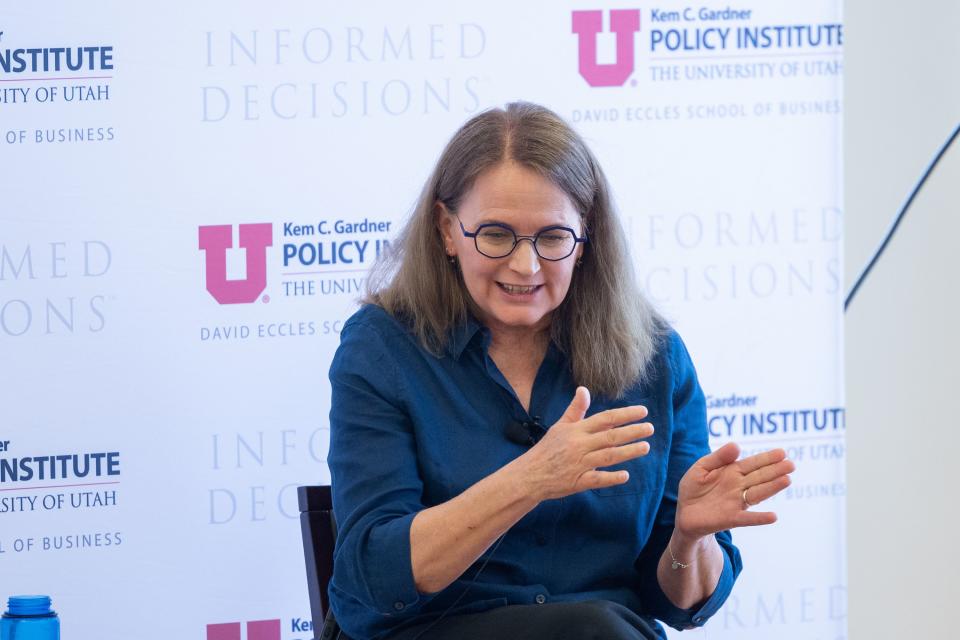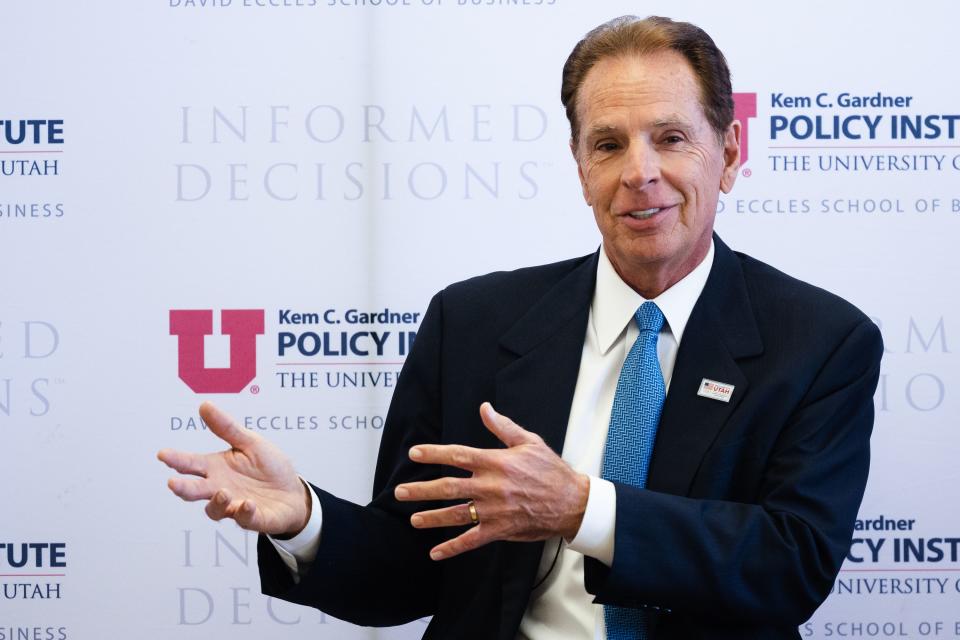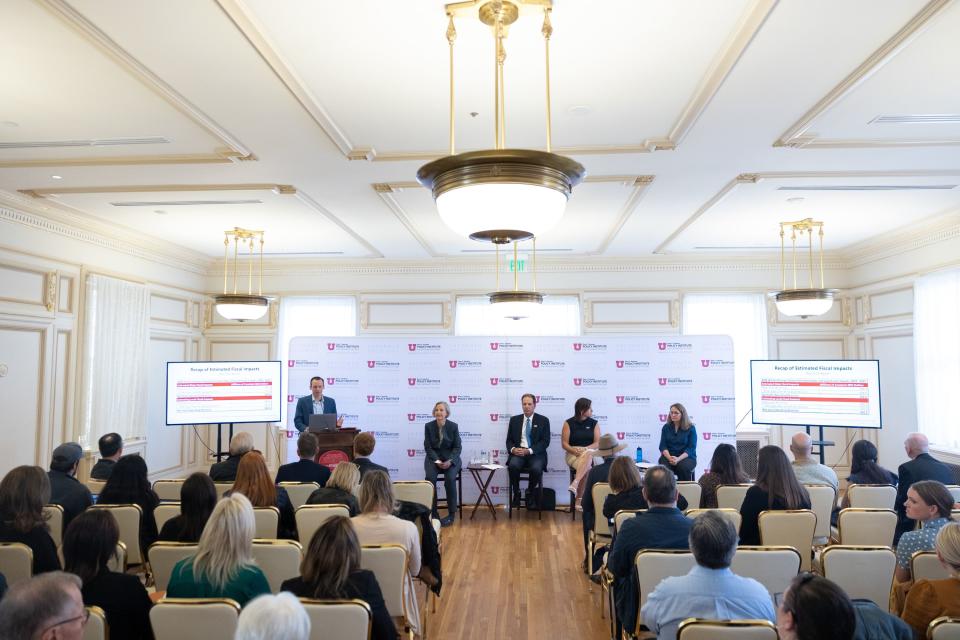Here’s why a new study says Utah is ready to host another successful Olympics

The founder of Utah Clean Energy admits she wasn’t always excited about Salt Lake City hosting a Winter Games.
“I’ll say, I wasn’t sure I wanted the Olympics back in 2002. I was one of those folks. And then I had the time of my life,” Sarah Wright said during a panel discussion Thursday highlighting environmental and other benefits of Salt Lake City’s bid to host again in 2030 or 2034.
During the 2002 Winter Games in Salt Lake City, Wright explained to the audience gathered to hear new findings from the University of Utah’s Kem C. Gardner Policy Institute that she saw “Utah blossom in a new way that was more welcoming.”
The longtime activist said another Winter Games could leave an important legacy for the environment by accelerating efforts in Utah to combat climate change, including through more dependence on electricity to power vehicles.
“I’ve always believed that Utah could be the conservative state that really leads out on smart climate solutions,” she said, calling hosting again a chance to show the world “you can come together and do hard things and that you can leave a legacy of a stable climate.”
Joining Wright for the discussion held at the Thomas S. Monson Center in downtown Salt Lake City were two leaders of the Salt Lake City-Utah Committee for the Games that’s behind the bid, Fraser Bullock and four-time Olympic speedskater Catherine Raney Norman.
They spent an hour talking about what the report described as “significant factors” seen as strengthening Utah’s Olympic bid as the race to host the 2030 and 2034 Winter Games gets more competitive.
“Utah’s demographic, social, and environmental factors favorably position the state to host another successful Olympic and Paralympic Winter Games,” the study from the Kem C. Gardner Policy Institute concludes.
The new 12-page report was issued Thursday as a supplement to last year’s analysis that showed bringing another Olympics to the state that hosted the 2002 Winter Games would have a total economic impact of $3.9 billion.
Instead of forecasting the number of new jobs created and other financial benefits from holding a Winter Games, the new report focuses on making a case for why Utah is a strong candidate.
Salt Lake City is in the running to host either the 2030 or 2034 Winter Games, but Utah’s bid team has stated a preference for the later date due to another American city, Los Angeles, hosting the 2028 Summer Games.

Related
The International Olympic Committee postponed making a pick last December from among Salt Lake City; Sapporo, Japan; and Vancouver, Canada; and instead, decided to look at the effects of climate change while opening up the race to new contenders.
Under the IOC’s new, less formal bid process, a decision on hosts for both the 2030 and 2034 Winter Games may come some time next year. There are now an unknown number of places vying for a Winter Games, and both Sweden and Switzerland are considering bids.
The IOC’s interest in climate change
The panel’s moderator, institute director Natalie Gochnour, asked the question she said everyone wants an answer to — when will Utahns know if another Winter Games is coming to the state?
“The IOC is the only one that can answer that,” Bullock said. But he said the Switzerland-based organization’s upcoming annual session in October in India could be “a milestone,” along with next year’s meeting before the start of the 2024 Summer Games in Paris.
Bullock clarified after the panel discussion that he does not expect Winter Games hosts to be named before next year’s IOC session in Paris. This year, however, the IOC could make decisions related to the effects of climate change on the Winter Games.
The IOC has suggested its own review of the impact of global warming on snow sports could lead in the future to rotating the Winter Games among a designated group of host cities.
Utah’s bidders aren’t committed yet to being considered as a permanent host, Bullock told the panel audience.
“Some of us would sign up for it today, but we understand there needs to be a community dialogue around this,” he said. But Utah bidders are “participating in a study towards rotational Games. Ideally, being every 20 years the Games would come back.”
Bullock said he “believes Utah is the perfect partner to be able to be a candidate for that. We think we’ll know more in October of the direction the IOC is heading towards rotational Games.”
Climate change gets mentioned in the institute’s new report.
Given Utah’s ski industry, the report stated Utah “understands the importance of planning for future climate challenges, committing to sustainable practices, and, ultimately, producing a climate positive Games.”
Salt Lake City can be counted on for reliable competition conditions at least through 2050, according to a scientific review that found that the snowfall in four previous Winter Games hosts, in France, Russia, Germany and Lake Tahoe, is already unreliable.
Athletes, Raney Norman said, want to ensure that winter sports remain viable as temperatures rise. She said they’re concerned they won’t be able continue to doing what “they love because the environment is changing so dramatically.”
The report said having well-maintained facilities built for Salt Lake City’s last Winter Games in place, like the bobsled, luge and skeleton track near Park City, minimizes the potential negative environmental impacts of another Olympics.
Infrastructure improvements made the past two decades, such as the new Salt Lake City International Airport “mean a future Games will not require any Olympic-specific new construction projects,” the report said, although “minimal expansions” would be needed.

What helps sets Utah apart from other bid cities
The new report cites a Deseret News/Hinckley Institute of Politics poll from February that found 82% of Utahns approve of another Olympics, a higher number than in other bid cities, especially Sapporo and Vancouver, where support lags.
Bullock suggested both Sapporo and Vancouver may have to wait a while to host again. Sapporo was the site of the first Winter Games held outside of Europe and North America, in 1972, and Vancouver hosted in 2010.
He said the “dream scenario” is that Sweden will be chosen for 2030, and Salt Lake City, for 2034 but added bids can always change. Swedish officials have yet to formally get in the race, but a recent poll showed strong public support.
Utah’s positive poll results dating back to the 2002 Winter Games are seen in the report as an example of the state’s residents placing a high value on “civic pride and other intangible benefits” associated with hosting.
“Residents and visitors overwhelmingly had a positive experience at the 2002 Games,” the reports said, adding that hosting again is “expected to bring similar opportunities for increased national and community pride and sense of unity as seen in 2002.”
Related
Other social factors in Utah’s favor are the high rate of volunteerism and charitable giving in the state. Utah is the top state in the nation for volunteering, with Utahns contributing an average of 116 hours annually per person, compared to 90 hours nationwide.
“This level of volunteerism is not new,” the report pointed out, noting at the 2002 Games, nearly 70,000 people applied for some 21,000 volunteer positions and the estimated 4.6 million hours of work contributed saved as much as $92 million in labor costs.
Utah also ranks highest in social capital, the bonds between families, communities, workplaces, religious congregations and other groups, and is known for having a healthy, outdoor-oriented population, according to the report.
Related
Demographic pluses also include the state’s “vibrant and youthful population” that’s the youngest in the nation and among the fastest-growing, the report said, noting Utah is becoming more racially and ethnically diverse.
“Important steps” have been taken in Utah toward equity, diversion and inclusion, the report stated, including recognizing Juneteenth National Freedom Day a state holiday, a way to commemorate the of slavery in the United States.
The success of the 2002 Games made Utahn an attractive place for businesses, particularly those related to sports, according to the report, while “the Olympic facilities and slopes remain world class,” helping to make the state a winter sports capital.


